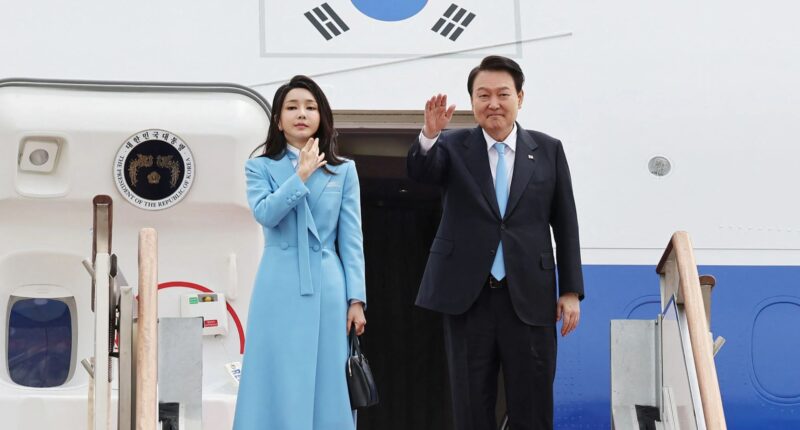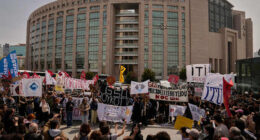SOUTH Korea’s martial law crisis was sparked after a handbag scandal engulfed the president’s wife.
Yoon Suk Yeol’s supposed attempt to seize power on Tuesday followed a sharp decline in his approval ratings – and his announcement might lead to him facing trial for treason.



Yoon’s approval rating had plunged below 20 per cent after the year-long corruption scandal had hammered his administration.
His wife, Kim Keon-hee, was caught allegedly accepting a 3m won (£1,800) luxury Dior handbag from a supporter.
But the supporter, a Korean American pastor, filmed the September 2022 exchange with a camera concealed in his watch.
The pastor later said Voice of Seoul, a left-leaning YouTube channel critical of the president, had supplied him with the watch and the Dior bag, according to CNN.
The clip was then published to YouTube in late 2023 with Yoon refusing to apologise when he first raised the issue this February.
In the clip, Kim can be heard speaking to the pastor saying: “Why do you keep bringing these? Please, you don’t need to do this.”
The bag, reportedly a cloud blue calfskin Lady Dior Pouch, exceeded the legal gift value limit for government officials and Kim later was questioned by prosecutors.
The scandal rumbled on with Yoon eventually apologising in November as he sought to rebuild his public image.
During the apology, Yoon also lashed out at the scandal, claiming the video was leaked as a “political manoeuvre”.
He said his wife had been excessively “demonised” during the scandal and said the parliament, where the opposition has a majority, was “problematically” investigating her.
Yoon said his defence of his wife “is absolutely not motivated by love for my wife or a desire to defend her”, saying a “special counsel is an attempt to play politics under the guise of the law”.
The first lady has not been charged by prosecutors.
Yoon’s November apology also included other controversies surrounding his wife.
Kim has also been accused of participating in a stock manipulation scheme, of falsifying her resume, and plagiarising parts of her PhD.


Yoon’s popularity had seen his party only gain five seats in April’s midterm elections, remaining in second place by a large margin.
Now, Yoon is facing impeachment and criminal charges after declaring martial law on Tuesday night.
He did so on the recommendation of his defence minister Kim Yong-hyun, Yonhap reports, who has now resigned.
But his extreme decision for military rule came after analysts said his administration was a “lame duck” and it “last ditch attempt” to pass his agenda.
Six hours after calling martial law he performed a humiliating U-turn, but not before he had ordered elite special forces troops to seize the National Assembly parliament.
Opposition lawmakers have now tabled a motion to impeach Yoon and boot him out of office.


The main opposition party, the Democratic Party, has begun formalising treason charges against Yoon.
A senior opposition member of parliament, Park Chan-dae, said: “Even if martial law is lifted, he cannot avoid treason charges.”
The defence minister is also facing impeachment as well as criminal charges.
Kim said: “First, as defence minister, I feel deeply responsible and sorry for causing concern and confusion in regard to the martial law.
“All members of the armed forces involved in the implementation of the emergency martial law only did their duty at my direction. I take full responsibility for it.”
The sentence for treason in South Korea is up to the death penalty – but the country hasn’t executed anyone since 1997.
Around 50 prisoners in the country are currently under a sentence of death.
The South Korean government says it keeps the penalty in order to deter violent crime, Amnesty International says.
In 2014, a court sentenced one lawmaker to 12 years in prison for treason after he formed a “revolutionary organisation” and conspired to overthrown the government.
Yoon’s party – People Power – only controls 108 seats in the 300 seat National Assembly legislature.
Lee Jae-myung – the leader of the opposition – has slammed the declaration Wednesday as “a coup against the people” and said the ruling party might try again.
He has hosted a massive rally outside the National Assembly saying the “great Korean people [had] overcome this coup”.
What is martial law?
MARTIAL law is the temporary replacement of a civilian government with military rule – typically during war or major disasters.
Historically, it has been brought in after coups, during protests, to suppress political dissent or stabilise insurrections.
It involves the military taking control of the normal legal system and control of civilians.
Ordinary laws and civil liberties may be suspended under martial law.
It is a drastic measure with significant implications for individual freedoms and the rule of law.
While it’s meant to be temporary, martial law can be indefinite.



















